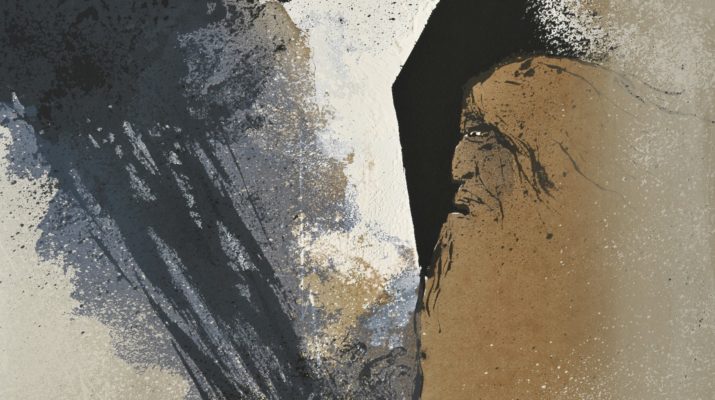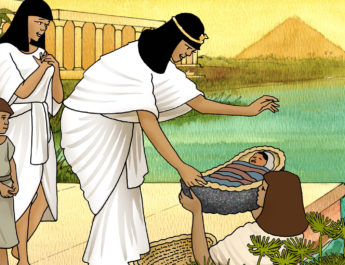Genesis 7:1-5, 11-18 & 8:6-18 & 9:8-13
Easter Vigil C
BibleHub
7 1 Then the LordA said to Noah,B “Go into the ark,C you and all your household, for I have seen that you alone are righteousD beforeE me in this generation.F
Notes on verse 7:1
A “Lord” = YHVH. From havah (to be, become) or hayah (to come to pass, become, be). This is the name of the God of Israel, the self-existent and eternal one, the tetragrammaton. This pronunciation has been lost to time so “Lord” is generally used in its place.
B “Noah” = noach. From nuach (to rest, calm, camp, free, place, remain, satisfy, settle, station, or wait; implies settling down in a literal or figurative sense). This is Noah or Noach, meaning rest.
C “ark” = tebah. Probably from Egyptian T-b-t (chest, coffin). Used for Moses’ basket, Noah’s ark, and the ark of the covenant.
D “righteous” = tsaddiq. From the same as tsedeq (rightness, righteousness, just cause, vindication; that which is right in a natural, moral, or legal sense; abstractly equity; figuratively prosperity). This is just, innocent, righteous, righteous one, or lawful.
E “before” = Literally “before my face.”
F “generation” = dor. From dur (to move in a circle, which implies living somewhere or remaining there; it can also be the sense of piling or heaping up). This is a revolution of time, which is to say, an age or generation. It can also be a dwelling or one’s posterity.
2 Take with you seven pairs of all cleanG animals,H the maleI and its mate;J and a pair of the animals that are not clean, the male and its mate;
Notes on verse 7:2
G “clean” = tahor. From taher (bright, which implies being pure or clean; to purge, cleanse, or purify; clean in a ritual sense or a moral one (i.e. moral or holy)). This is clean or pure in a literal, ritual, or ethical sense.
H “animals” = behemah. This is animal or cattle. It is often used of large quadrupeds.
I “male” = ish. Perhaps from enosh (human, humankind, mortal); from anash (to be weak, sick, or frail). This is man, husband, another, or humankind.
J “mate” = ishshah. Related to “male” in v7:2 From ish (see note I above). This is woman, wife, or female.
3 and seven pairs of the birdsK of the airL also, maleM and female,N to keep their kindO alive on the face of all the earth.
Notes on verse 7:3
K “birds” = oph. From uph (to fly, flee, shine, be weary, be faint). This is a flying creature.
L “air” = shamayim. Root may mean being lofty. This is sky, the air, or heaven. It is in a dual noun form so this might refer to the part of the sky where the clouds move on the one hand and the part beyond that where the sun, moon, and stars are on the other hand.
M “male” = zakar. From zakar (to remember, to mark something so that it can be recalled, to be mindful of, to mention). This is male. Properly, perhaps, it means one who is remembered, which is to say a male.
N “female” = neqebah. From naqab (to pierce, bore holes, puncture; to make a hole more or less forcefully; also to curse or libel). This is female or woman from an anatomical reference.
O “kind” = zera. From zara (to sow or scatter seed; conceive or yield). This is seed or sowing. It can, thus, mean a fruit, plant, sowing time, child, offspring, or posterity.
4 For in seven days I will send rain on the earth for forty days and forty nights; and every living thingP that I have made I will blot outQ from the face of the ground.”R 5 And Noah did all that the Lord had commanded him.
Notes on verses 7:4-5
P “living thing” = yequm. 3x in OT. From qum (to arise, stand, accomplish, establish, abide; rising against, getting up after being sick or asleep, arising from one state to another, becoming powerful, or rising for action; standing in a figurative sense). This is substance or existence. Something that stands and thus exists. Hence, a living thing.
Q “blot out” = machah. This is to rub, which implies to erase. It can also be making something smooth with grease or oil. So, this could we wipe out, blot out, or destroy. Also, to touch or reach.
R “ground” = adamah. From the same as adam (man, humankind); perhaps from ‘adom (to be red). This is ground, earth, soil as red, or land.
11 In the six hundredth year of Noah’s life,S in the second month, on the seventeenth day of the month, on that day all the fountainsT of the great deepU burst forth, and the windows of the heavens were opened.V 12 The rain fell on the earth forty days and forty nights.
Notes on verses 7:11-12
S “life” = chay. Related to “keep…alive” in v7:3. From chayah (to live or keep alive literally or figuratively). This is alive, living, lifetime. It can also be used to describe someone’s age. It can refer to animals, plants, water, or a company or congregation of people. It is life in a very broad sense.
T “fountains” = mayan. From ayin (eye, appearance; eye in a literal or figurative sense; a fountain). This is a spring, well, or fountain. Figuratively, this is a source of contentment.
U “deep” = tehom. Perhaps from hum (to roar, murmur, cause an uproar, agitate; to defeat in battle, destroy). This is the deep or the abyss. Either understood as a formless empty place of nothingness or as a place of confusion filled with water – the deep the feeds the waters of the earth.
V “opened” = patach. This is to open wide in a literal or figurative sense. So, it is open, draw out, let something go free, break forth. It can also mean to plow, engrave, or carve
13 On the veryW same day Noah with his sons, ShemX and HamY and Japheth,Z and Noah’s wifeAA and the three wives of his sons entered the ark,
Notes on verse 7:13
W “very” = etsem. From atsam (vast, numerous, strong; to close one’s eyes, to make powerful; to break bones). This is self, life, strength, bone, or substance.
X “Shem” = shem. 17x in OT. From the same as shem (name, fame, renown; indicates something essential about a person –about their individuality; can also mean honor, authority, or character); perhaps from sum (to put, place, set). This is Shem, meaning name.
Y “Ham” = cham. 16x in OT. Perhaps from the same as cham (hot, warm); from chamam (to be warm, heat; to be hot in a literal or figurative sense; to mate). This is Ham.
Z “Japheth” = yapheth. 11x in OT. From pathah (to be simple, entice, deceive, persuade, allure, be silly); from pethi (simple, silly, foolish, easily deceived); from pathah (to be wide open, deceive, entice, persuade, to be simple, delude). This Japheth, meaning expansion.
AA “wife” = ishshah. Same as “mate” in v7:2. See note J above.
14 they and every wild animal of every kind, and all domestic animalsBB of every kind, and every creeping thingCC that creepsDD on the earth, and every birdEE of every kind—every bird, every winged creature.
Notes on verse 7:14
BB “domestic animals” = behemah. Same as “animals” in v7:2. See note H above.
CC “creeping thing” = remes. 17x in OT. From ramas (gliding swiftly, moving with quick steps or crawling; to swarm or prowl or move about). This is things that move rapidly or creep such as reptiles.
DD “creeps” = ramas. 17x in OT. Related to “creeping thing” in v7:14. See note CC above.
EE “bird” = tsippor. From tsaphar (to skip about, maybe to depart). This is a little bird like a sparrow – a little bird as one that hops about.
15 They went into the ark with Noah, two and two of all fleshFF in which there was the breathGG of life. 16 And those that entered, male and female of all flesh, went in as GodHH had commanded him; and the Lord shut him in.
Notes on verses 7:15-16
FF “flesh” = basar. From basar (being a messenger, publish, carry preach; properly, this is being fresh, rosy or cheerful as one bearing news). This is flesh, the body, fat, skin, self, nakedness, humankind, or kin. It can also refer to private parts.
GG “breath” = ruach. This is breath, wind, air, cool, spirit. This is wind, which resembles the breath and so this can be used figuratively for life itself or being frail/mortal/impermanent. It can refer to the air of the sky or the spirit.
HH “God” = Elohim.
17 The floodII continued forty days on the earth; and the waters increased,JJ and bore up the ark, and it rose high above the earth. 18 The waters swelledKK and increased greatly on the earth; and the ark floatedLL on the face of the waters.
Notes on verses 7:17-18
II “flood” = mabbul. 13x in OT. Perhaps from yabal (to bring, carry, flow, lead forth). This is a flood or deluge.
JJ “increased” = rabah. This is increasing in any aspect whether quantity, authority, size, quality, greatness, etc.
KK “swelled” = gabar. This is to be strong or mighty. It can mean to prevail or to be insolent.
LL “floated” = halak. This is go, come, walk. It is walk literally and figuratively and includes people and animals. It can be used figuratively for one’s moral life – how we walk according to God’s way or against it. It can also refer to the walk of life as in the course one’s life takes, the choices we make, etc.
8 6 At the end of forty days Noah opened the window of the ark that he had made 7 and sent out the raven;MM and it wentNN to and froOO until the waters were dried up from the earth.
Notes on verses 8:6-7
MM “raven” = oreb. 10x in OT. Perhaps from arab (to grow dark, become gloomy); from ereb (evening, night, twilight) or from arab (to bargain, barter, give or take in pledge; to braid or intermingle). This is a raven.
NN “went” = yatsa + yatsa. This is to go or come out in a literal or figurative sense. The second yatsa is an Infinitive Absolute. The Infinitive Absolute serves to emphasize the sentiment of the word. It is rather like Foghorn Leghorn’s speech pattern, “I said, I said.”
OO “fro” = shub. To turn back, return, turn away – literally or figuratively. Doesn’t necessarily imply going back to where you started from. This is also the root verb for the Hebrew word for repentance “teshubah.”
8 Then he sent out the dovePP from him, to see if the waters had subsidedQQ from the face of the ground; 9 but the dove found no placeRR to set its foot, and it returned to him to the ark, for the waters were still on the face of the whole earth. So he put out his hand and took it and brought it into the ark with him.
Notes on verses 8:8-9
PP “dove” = yonah. Perhaps from yayin (wine; root means to effervesce). This is a dove or pigeon. Used to refer to the exiles coming home, to describe sails of ships. Also used figuratively for mourning or as a description of beauty.
QQ “subsided” = qalal. This is to be little, insignificant, swift. It can also mean to bring down in esteem, create contempt, curse
RR “place” = manoach. Related to “Noah” in v7:1. 6x in OT. From nuach (see note B above). This is a resting place or the condition of rest – quiet. Figuratively, it is a spot where you can be settled in and thus a home.
10 He waitedSS another seven days, and again he sent out the dove from the ark; 11 and the dove came back to him in the evening,TT and there in its beak was a freshly plucked olive leaf; so Noah knewUU that the waters had subsided from the earth. 12 Then he waitedVV another seven days, and sent out the dove; and it did not returnWW to him any more.
Notes on verses 8:10-12
SS “waited” = chul. This is whirling around so dancing as in a circle or writhing in pain. It is used particularly for the pain of childbirth or from writhing due to fear. It can also be falling in pain or waiting.
TT {untranslated} = hinneh. From hen (lo! Behold! If, though; an expression of surprise). This is to draw attention, show suddenness or surprise, or to emphasize the importance of the coming statement. See! Lo! Behold!
UU “knew” = yada. This is to know, acknowledge, advise, answer, be aware, be acquainted with. Properly, this is to figure something out by seeing. It includes ideas of observation, recognition, and care about something. It can be used causatively for instruction, designation, and punishment.
VV “waited” = yachal. This is to wait, which implies patience, hope, and trust. It can also be pained waiting.
WW “return” = shub. Same as “fro” in v8:7. See note OO above.
13 In the six hundred first year, in the first month, on the first day of the month, the waters were dried up from the earth; and Noah removedXX the covering of the ark, and looked,YY and saw that the face of the ground was drying. 14 In the second month, on the twenty-seventh day of the month, the earth was dry.
15 Then God said to Noah, 16 “Go out of the ark, you and your wife, and your sons and your sons’ wives with you. 17 Bring out with you every living thing that is with you of all flesh—birds and animals and every creeping thing that creeps on the earth—so that they may aboundZZ on the earth, and be fruitfulAAA and multiply on the earth.” 18 So Noah went out with his sons and his wife and his sons’ wives.
Notes on verses 8:13-18
XX “removed” = sur. This is to turn aside in a literal or figurative sense – to depart, decline, rebel, remove, or withdraw.
YY {untranslated} = hinneh. Same as v8:11. See note TT above.
ZZ “abound” = sharats. 14x in OT. This is to wriggle, swarm, teem, creep. So, it can mean a great increase or abundant breeding.
AAA “be fruitful” = parah. This is to bear fruit, grow, be fruitful, increase. It is bearing fruit in a literal or figurative sense.
9 8 Then God said to Noah and to his sons with him, 9 “As for me,BBB I am establishingCCC my covenantDDD with you and your descendantsEEE after you, 10 and with every living creatureFFF that is with you, the birds, the domestic animals, and every animal of the earth with you, as many as came out of the ark.
Notes on verses 9:8-10
BBB {untranslated} = hen. Related to {untranslated} in v8:11. See note TT above.
CCC “establishing” = qum. Related to “living thing” in v7:4. See note P above.
DDD “covenant” = berith. Perhaps from barah (to eat, choose, make clear); perhaps from bar (grain, wheat); from bara (to select, purify, cleanse, test, brighten, polish). This is a compact, covenant, alliance, treaty, or league.
EEE “descendants” = zera. Same as “kind” in v7:3. See note O above.
FFF “creature” = nephesh. Related to naphash (to refresh or be refreshed). This is soul, self, person, emotion. It is a breathing creature. Can also refer to appetites and desires.
11 I establish my covenant with you, that never again shall all flesh be cut offGGG by the waters of a flood, and never again shall there be a flood to destroy the earth.”
12 God said, “This is the signHHH of the covenant that I make between me and you and every living creature that is with you, for all futureIII generations: 13 I have set my bowJJJ in the clouds,KKK and it shall be a sign of the covenant between me and the earth.
Notes on verses 9:11-13
GGG “cut off” = karath. This is to cut down, cut off, or make a covenant (idiom for making a covenant is “to cut a covenant”). It can also mean to destroy, fail, or consume.
HHH “sign” = ot. From avah (to mark, sign, point out); OR from uth (to agree). This is a sign in a literal or figurative sense. It could be a flag or monument. It could be evidence or a mark. It could also be an omen or a miracle.
III “future” = olam. This is a long scope of time whether in the past (antiquity, ancient time) or in the future (eternal, everlasting).
JJJ “bow” = qesheth. Perhaps from qush (to set a trap, lure, ensnare) OR from qashah (to be fierce, cruel, dense, tough, severe). This is a bow, arrow, or archer. Bow can be used figuratively for strength.
KKK “clouds” = anan. May be from anan (cover, cloud over; figuratively, acting in a secret way, practicing magic or soothsaying). This is a cloud as something that covers the sky.
Image Credit: “Noah and the Torrential Floods” by Adi Holzer, 1975




